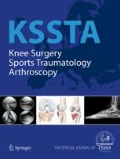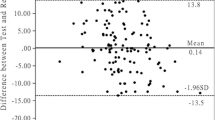Abstract
We translated and adapted the English RC-QOL (rotator cuff quality of life) questionnaire into Italian and performed reliability and validity evaluations of the Italian RC-QOL version in patients with rotator cuff tears. The RC-QOL English version was translated into Italian by a bilingual orthopaedic surgeon. The back translation of the Italian version into English was performed by another bilingual orthopaedic surgeon. The original version was compared with the back translation. The RC-QOL questionnaire was then administered to 22 subjects (range 45–74 years) with a diagnosis of rotator cuff tears. For test–retest evaluation, the 22 patients were asked to complete the questionnaire at first examination, and 30 min following the end of this examination. The intraclass correlation coefficient for the 22 patients was 0.94 (95% CI = 0.85–0.98), indicating a high reliability. There were no significant differences between the scores immediately after the consultation and 30 min later. The Italian and the English versions of the RC-QOL questionnaire evaluate the same aspects of clinical severity in patients with rotator cuff tears.
Similar content being viewed by others
References
Altman DG, Gore SM, Gardner MJ, Pocock SJ (1983) Statistical guidelines for contributors to medical journals. Br Med J (Clin Res Ed) 286:1489–1493
Hollinshead RM, Mohtadi NG, Vande Guchte RA, Wadey VM (2000) Two 6-year follow-up studies of large and massive rotator cuff tears: comparison of outcome measures. J Shoulder Elbow Surg 9:373–381
Huber W, Hofstaetter JG, Hanslik-Schnabel B, Posch M, Wurnig C (2005) Translation and psychometric testing of the rotator cuff quality-of-life measure (RC-QOL) for use in German-speaking regions. Z Rheumatol 64:188–197
Karanicolas PJ, Bhandari M, Kreder H, Moroni A, Richardson M, Walter SD, Norman GR, Guyatt GH (2009) Evaluating agreement: conducting a reliability study. J Bone Joint Surg Am 91(3):99–106. doi:10.2106/JBJS.H.01624
Kirshner B, Guyatt G (1985) A methodological framework for assessing health indices. J Chronic Dis 38:27–36
MacDermid JC, Ramos J, Drosdowech D, Faber K, Patterson S (2004) The impact of rotator cuff pathology on isometric and isokinetic strength, function, and quality of life. J Shoulder Elbow Surg 13:593–598
Mohtadi NG, Hollinshead RM, Sasyniuk TM, Fletcher JA, Chan DS, Li FX (2008) A randomized clinical trial comparing open to arthroscopic acromioplasty with mini-open rotator cuff repair for full-thickness rotator cuff tears: disease-specific quality of life outcome at an average 2-year follow-up. Am J Sports Med 36:1043–1051
Razmjou H, Bean A, van Osnabrugge V, MacDermid JC, Holtby R (2006) Cross-sectional and longitudinal construct validity of two rotator cuff disease-specific outcome measures. BMC Musculoskelet Disord 7:26. doi:10.1186/1471-2474-7-26
Richards RR, An K (1999) A standardized method for assessment of shoulder function. Research committee, American shoulder and elbow surgeons. J Shoulder Elbow Surg 3:347–352
Terwee CB, Bot SD, de Boer MR, van der Windt DA, Knol DL, Dekker J, Bouter LM, de Vet HC (2007) Quality criteria were proposed for measurement properties of health status questionnaires. J Clin Epidemiol 60:34–42. doi:S0895-4356(06)00174-0
Ware JE Jr, Sherbourne CD (1992) The MOS 36-item short-form health survey (SF-36). I. Conceptual framework and item selection. Med Care 30:473–483
Author information
Authors and Affiliations
Corresponding author
Appendix
Appendix





Rights and permissions
About this article
Cite this article
Papalia, R., Osti, L., Leonardi, F. et al. RC-QOL score for rotator cuff pathology: adaptation to Italian. Knee Surg Sports Traumatol Arthrosc 18, 1417–1424 (2010). https://doi.org/10.1007/s00167-009-0943-5
Received:
Accepted:
Published:
Issue Date:
DOI: https://doi.org/10.1007/s00167-009-0943-5



